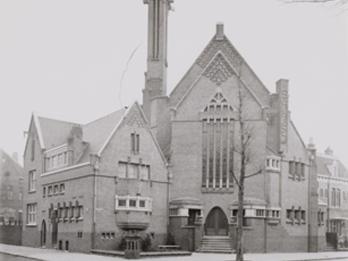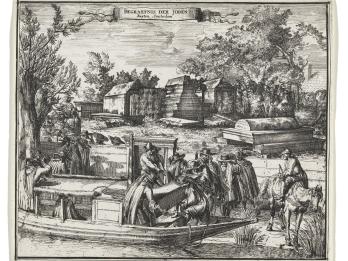Responsum: On the Right to Bequeath a Mitzvah
Yom Tov Tzahalon
17th Century
Question: Since it is true from time immemorial and ancient years that we observe the customs of our ancestors, as is the practice of the Musta‘arabim [Arabic-speaking Jews] everywhere among the Jews, whether in Aleppo or in Baghdad or in all the places where there are Musta‘arabim, they follow the customs of their ancestors, and a custom accepted by Jews is considered like a Torah law. We have a custom that anyone who has a proprietary right to one mitzvah [an honor in the synagogue], he relies upon it and bequeaths it to his sons and the sons of his sons to the end of all generations. If, perish the thought, he did not leave any sons, his estate shall pass to his closest [male] relative [see Leviticus 21:2] to the end of the family, and no one may challenge the inheritor at all.
Some of these customs are as follows: one who lights the lamps in the synagogue, who also takes the place of the prayer leader; one who reads on the Sabbath [the Torah portion] of Beshalaḥ [Exodus 13:17ff.], who reads the Song [of the Sea] on the seventh day of Passover; one who reads the Admonitions [tokhaḥah, Deuteronomy 28:15ff.], and there is someone who is the first to be called to Torah reading, for the start of Genesis; one who lights the lamps at the Portion of Jethro [Exodus 18ff.] and on the Festival of Shavuot and also reads the Ten Commandments, when his close ones and friends rejoice with him. This is the heritage of the servants of the Lord, and their due reward (Isaiah 54:17).
Reuben would light the lamps on the Sabbath of Jethro and on the festival of Shavuot and read the Ten Commandments throughout his life, but in his old age he fell into the depths of poverty, and he was also extremely old, and due to his age, his words were no longer clear, although he invested his soul in the task. When the congregation saw all these traits in him, they spoke to him respectfully, and informed him that it was not worthy for a man such as him to recite the Ten Commandments, as he was in that state. And he too, in honor of the Torah, admitted this, and gave permission for someone else to recite the Ten Commandments, so that his proprietary right would not be lost. Toward the end of Reuben’s life, before he died, he said to his nephew Simeon, “I have grown quite old and I do not have the strength to continue with this practice, whether because of poverty or old age. As it is the heritage of our ancestors, on your life you should light the lamp and fulfill this mitzvah in my lifetime so that no stranger shall come among us.” Thus it was that Simeon retained this practice of lighting the lamp during Reuben’s lifetime. However, regarding the reading of the Ten Commandments, Reuben would give it to someone else to read, and he was pleased to hand over the task during his lifetime.
Now Reuben died and left behind the life of all Israel. Simeon took Reuben’s place for several years, year after year lighting the lamp on the portion of Jethro and on the festival of Shavuot. He did not know how to read, but would order someone who wanted to do so to read, and thus retained this mitzvah for fifteen years or more. By now he has a knowledgeable, intelligent son who has frequented wise scholars, and Simeon is pleased with his son’s ability, and he wants only his son to read the Ten Commandments, no one else. However, the sage R. David has displaced Simeon from his presumptive claim, arguing that there is no inheritance of mitzvot, and furthermore, that he is from a different congregation and his donations and dues go elsewhere. Nevertheless, for all those years he retained this mitzvah even though he is from another congregation, and no one ever challenged him. Yet now the sage challenges him with the above arguments. May our rabbis, the sages of Israel and their glory, instruct us as to whether the sage and the congregation have the authority to displace Simeon from the possession of his fathers and his fathers’ fathers, and the sage may read the Ten Commandments, or whether he retains his mitzvah in accordance with the custom of our ancestors the Musta‘arabim, as a custom accepted by Jews is considered like a Torah law. May our rabbis and our splendor instruct us in the correct path, and may their reward of the high honor of the Torah be doubled and redoubled from heaven.
Credits
Published in: The Posen Library of Jewish Culture and Civilization, vol. 5.


![6. [Image: 038 Bima Doors from the Rema Synagogue in Krakow, Early 18th century]. Carved Bima Doors, Floral Motif. Rema Synagogue, Bimah Doors or Remah Synagogue or Remu Synagogue. Rema Synagogue Krakow Exterior/Interior. AKA Remah Synagogue AKA Remuh Syn Set of curved doors with carving of peacock-shaped pitcher filled with foliage and fruit extending to top of door.](/sites/default/files/styles/embedded_image_sm_1x/public/images/vol05/Posen5_blackandwhite100_color.jpg?itok=KWGC6u-B)



